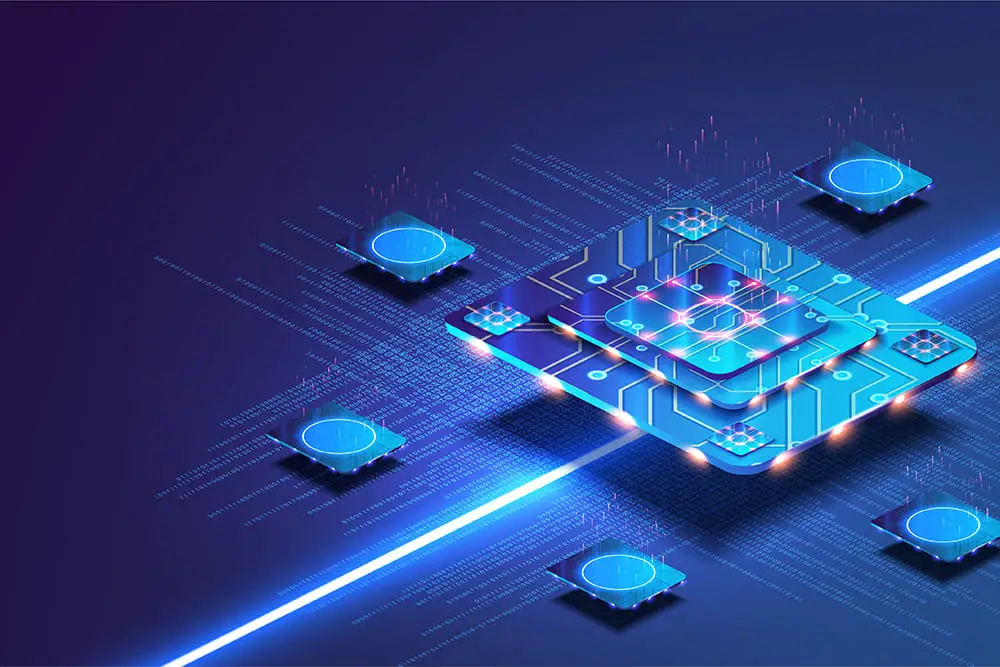Quantum Computing: A Revolutionary Horizon

Quantum computing holds immense potential to revolutionize various fields, spanning scientific research, cryptography, and drug discovery. However, harnessing the capabilities of this advanced computing paradigm requires a comprehensive understanding of its unique quirks, which can significantly impact the development and implementation of quantum computation applications.

Superposition and Entanglement: The Quantum Leap

Quantum computing leverages two fundamental principles of quantum mechanics: superposition and entanglement. Superposition allows a quantum bit (qubit) to exist in a state of ‘0’ and ‘1’ simultaneously. Entanglement, on the other hand, links multiple qubits, their states becoming interdependent and correlated. These properties enable quantum computers to perform certain computations exponentially faster than classical computers.
Scalability and Coherence: The Quantum Challenge
Despite the theoretical advantages, the development of practical quantum computers faces challenges in scalability and coherence. Constructing and maintaining an error-free, scalable array of qubits remains a significant engineering hurdle. Additionally, qubits are highly sensitive to environmental disturbances, which can lead to decoherence, causing errors in calculations.
Hybrid Systems: Bridging the Quantum-Classical Divide
To harness the potential of quantum computing while mitigating its challenges, researchers are exploring hybrid approaches that seamlessly integrate quantum and classical systems. By leveraging quantum capabilities for specific tasks and relying on classical computers for the remainder, hybrid systems aim to overcome the current limitations of pure quantum computation.
Education and Adaptation: Nurturing the Quantum Workforce
The nascent field of quantum computing requires a skilled workforce with a deep understanding of the underlying principles and practical applications. Educational institutions are actively developing programs to foster this expertise, encompassing both theoretical foundations and hands-on experience with quantum hardware.
Conclusion: A Path to the Quantum Future
Quantum computing holds the potential to reshape industries and drive scientific breakthroughs. Embracing the unique quirks of this paradigm, such as superposition and entanglement, while addressing scalability and coherence challenges, is crucial to unlocking its transformative power. Through innovative hybrid approaches, a skilled workforce, and continuous advancements in hardware, we can pave the path towards the future of computing, where quantum capabilities seamlessly augment and enhance our classical counterparts.# Quantum Computing Quirks: Preparing For The Future Of Computing
Executive Summary
Quantum computing represents a technological paradigm shift that holds immense potential to revolutionize various scientific and industrial domains. Its groundbreaking principles depart from classical computing norms, opening new avenues for problem-solving and innovation. As we venture into this quantum realm, it is imperative to recognize and address its inherent quirks and challenges to fully harness its transformative capabilities.
Introduction
Quantum computing, leveraging the counterintuitive principles of quantum mechanics, offers unparalleled computational power that eclipses classical computing paradigms. With its ability to tackle intricate problems that confound traditional computers, quantum computing promises to shape the future of scientific research, drug development, materials science, financial modeling, and more. However, understanding and navigating the intricacies of quantum computing requires a comprehensive understanding of its unique characteristics and potential pitfalls. This article delves into these quirks, providing insights into their significance and guiding us towards a future where quantum computing thrives.
FAQs
1. What are the key advantages of quantum computing?
Quantum computers possess several key advantages over classical computers, including:
- Superposition: Quantum bits (qubits) can exist in multiple states simultaneously, enabling the exploration of vast solution spaces exponentially faster than classical algorithms.
- Entanglement: Qubits can become interconnected and influence each other’s behavior, regardless of physical distance, leading to novel computing approaches and increased computational efficiency.
2. What are the main challenges in quantum computing development?
Quantum computing faces several challenges, such as:
- Qubit coherence: Maintaining the delicate superposition and entanglement states of qubits is crucial but challenging due to environmental noise and decoherence, requiring sophisticated error correction techniques.
- Scalability: Building quantum computers with a sufficient number of qubits to solve practical problems remains a significant hurdle, demanding advancements in qubit fabrication, control, and interconnection technologies.
3. When can we expect quantum computers to be widely available?
The timeline for widespread quantum computing availability is uncertain and subject to ongoing research and development progress. While near-term applications may focus on specialized domains, broader accessibility is anticipated in the coming years as quantum hardware and software ecosystems mature.
Top 5 Subtopics
Qubit Properties
- Superposition: Qubits can represent both 0 and 1 simultaneously, providing an exponential increase in computational possibilities.
- Entanglement: Qubits can be linked in such a way that their states become correlated, allowing for novel computing algorithms and enhanced problem-solving capabilities.
- Decoherence: Qubits are susceptible to environmental noise that can disrupt their delicate superposition and entanglement states, necessitating error correction measures.
- Control: Manipulating qubits with precision is a crucial challenge, requiring sophisticated control techniques to maintain their desired states and minimize errors.
- Measurement: Measuring qubits without disturbing their fragile states is essential for accessing computation results and presents a complex technical hurdle.
Quantum Algorithms
- Shor’s algorithm: This algorithm can factor large numbers exponentially faster than any known classical algorithm, with potential implications for cryptography and security.
- Grover’s algorithm: Designed to search unsorted databases, Grover’s algorithm offers a substantial speed advantage over classical search algorithms.
- Quantum simulation: Quantum computers can simulate complex quantum systems, enabling the exploration of phenomena that are intractable for classical computers, such as molecular interactions and material properties.
- Quantum machine learning: Quantum algorithms applied to machine learning tasks exhibit the potential to enhance pattern recognition, optimization, and predictive modeling capabilities.
- Quantum error correction: Techniques developed to combat decoherence and preserve the integrity of quantum information during computation.
Quantum Hardware
- Superconducting qubits: Superconducting circuits cooled to near absolute zero serve as a common platform for building quantum computers, offering relatively long coherence times.
- Trapped ion qubits: Ions suspended in a vacuum chamber using electromagnetic fields represent an alternative qubit technology with high control and scalability potential.
- Topological qubits: Exploiting the exotic properties of topological materials, topological qubits are theoretically fault-tolerant and may provide a path to scalable quantum computing.
- Quantum dots: Semiconductor nanostructures known as quantum dots can confine electrons, potentially enabling the development of scalable and stable qubits.
- Quantum photonics: Utilizing photons, or particles of light, quantum photonics offers the potential for long-distance quantum communication and computation.
Quantum Software
- Quantum programming languages: Specialized programming languages, such as Qiskit and Cirq, facilitate the development and execution of quantum algorithms.
- Quantum compilers: Translating high-level quantum code into executable instructions for specific quantum hardware platforms.
- Quantum simulators: Software tools that simulate quantum systems, enabling researchers and developers to test and debug quantum algorithms without requiring access to physical quantum hardware.
- Quantum optimization algorithms: Techniques for optimizing quantum circuits to reduce the number of required quantum gates and improve computational efficiency.
- Quantum debugging tools: Specialized tools designed to detect and correct errors in quantum algorithms and identify inefficiencies.
Quantum Applications
- Drug discovery: Quantum computing can accelerate the discovery and development of new drugs by simulating molecular interactions and predicting their properties.
- Materials science: Quantum algorithms can aid in the design and optimization of novel materials with tailored properties for various applications, such as energy storage and electronics.
- Financial modeling: Quantum computing has the potential to enhance financial modeling accuracy and risk assessment by simulating complex market dynamics and optimizing portfolios.
- Cryptography: Quantum algorithms pose significant challenges to traditional cryptographic methods, necessitating the development of quantum-resistant encryption schemes.
- Quantum simulation: Quantum computers can simulate complex quantum systems, enabling the exploration of phenomena that are intractable for classical computers, such as molecular interactions and material properties.
Conclusion
Quantum computing presents a transformative technology with the potential to revolutionize scientific research, industry, and society at large. However, harnessing its full power requires a comprehensive understanding of its unique quirks and challenges. By addressing the vulnerabilities of qubits, developing efficient quantum algorithms, and advancing quantum hardware and software capabilities, we can pave the way for a future where quantum computing thrives and unlocks unprecedented possibilities for problem-solving and innovation.
Keyword Tags
- Quantum computing
- Quantum quirks
- Quantum algorithms
- Quantum hardware
- Quantum software
